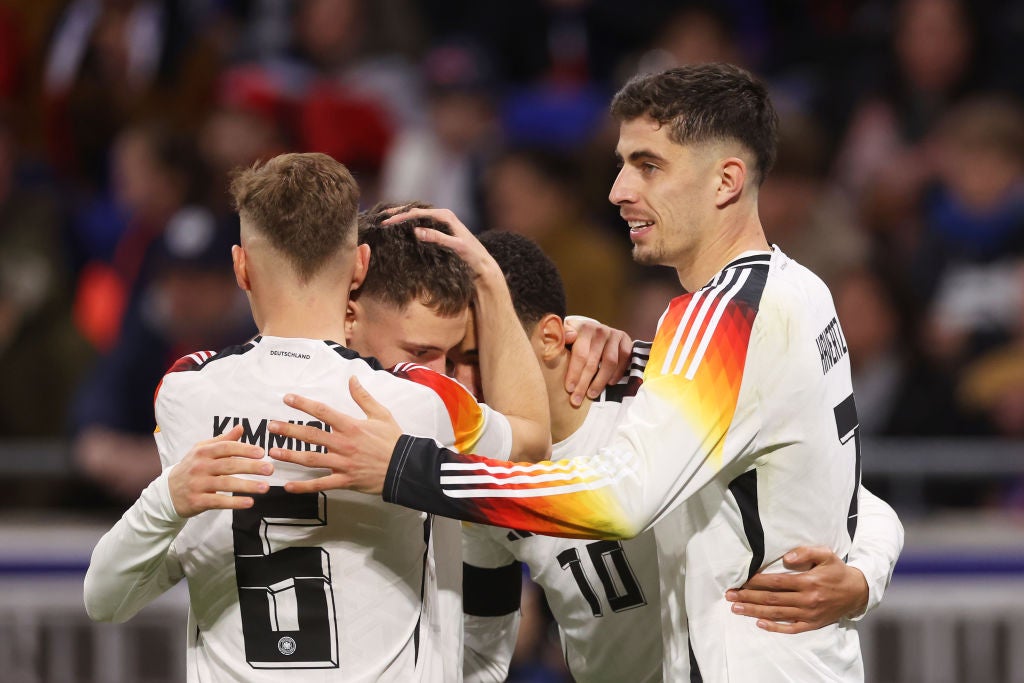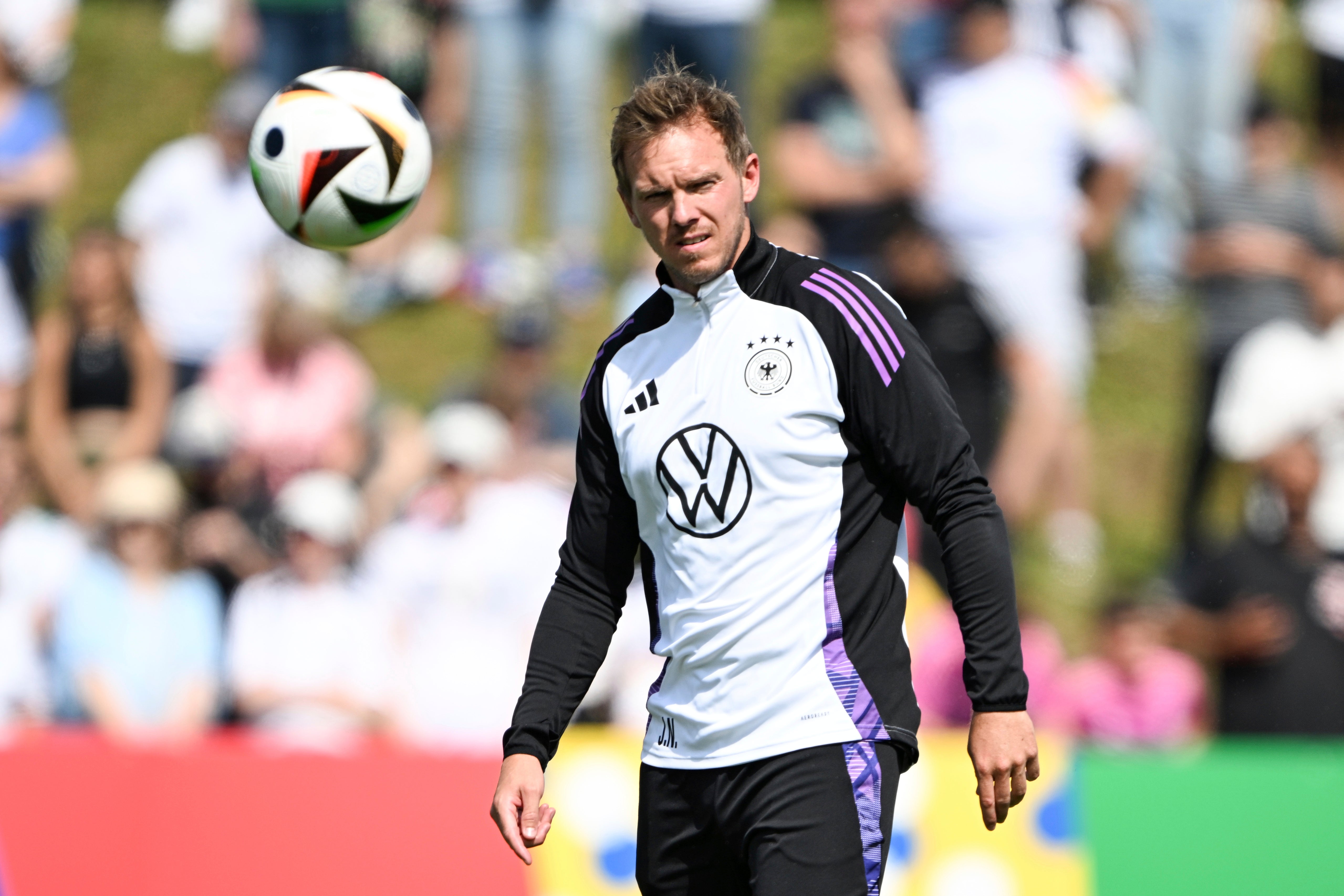The parallels felt uncanny. A Germany team at its lowest ebb for years, having been dispatched ignominiously from the group stages of two of the three previous tournaments, having ditched one manager and parachuting in another, were the hosts with the low expectations. If the 2006 World Cup came to symbolise a national footballing rebirth for Germany, surprise semi-finalists who played endearingly attacking football with a likeable bunch of players, it seemed as though the best-case scenario was a repeat of sorts in Euro 2024. Further embarrassment started to look more probable.
Because the 2022 World Cup brought as an early an exit as in 2018, the ultimate Turniermannschaft discovering the tournament would go on without them. And arguably 2023 was still worse; only partly because of the release of the Amazon documentary of the World Cup campaign in which Hansi Flick tried to motivate his players by comparing them to geese. It wasn’t the major reason why Flick became the first Germany manager to be sacked but it did contribute to rendering him a lame duck.
On the pitch, 2023 brought defeats to Belgium, Poland, Colombia and Japan, a 4-1 loss in Wolfsburg ending Frank’s reign; then, under new manager Julian Nagelsmann, Germany lost to Turkey and Austria. They had been beaten six times in a year; as West Germany, they only lost three times across 1987, 1988, 1989 and 1990.
The loss earlier this year of Franz Beckenbauer, the manager of the 1990 World Cup-winning side, and then Andreas Brehme, scorer of the only goal in the final, underlined that it was another era. And yet subsequent months have suggested renewal is coming rapidly. Germany scored after seven seconds of their opening game of 2024, Florian Wirtz setting them on their way to victory over France. The Netherlands were beaten three days later. June’s results have been less spectacular – a stalemate with Ukraine and a narrow win over Greece – but Nagelsmann, whose appointment had looked a case of him passing time until a club job became available, delivered his vote of confidence in April, signing a contract extension rather than returning to Bayern Munich.
Which may not have been an entirely altruistic step. If the sense in 2006 was that it was not a particularly talented German team, now there should be a very different impression. If the past offers evidence that reports of the demise of German football can be greatly exaggerated, there is a case for arguing that Nagelsmann’s team should kick off as second favourites only to France.
It is a sign of both Germany’s strength in depth and managerial choices that four Champions League final starters have not even made their squad, in Mats Hummels, Emre Can, Julian Brandt and Karim Adeyemi. Nagelsmann has not ducked a decision and if Hummels’ omission reflects concerns if an outspoken character would be suited to a role as a squad player, it also underlines the resources at his disposal. At centre-back, like centre midfield, like as No 10s, Germany are blessed. Antonio Rudiger has been arguably the best centre-back in the Champions League over the last few years and Nico Schlotterbeck was perhaps the finest this season (even if Hummels pipped him to a place in Uefa’s team of the tournament). Jonathan Tah, meanwhile, is a beneficiary of Bayer Leverkusen’s rise.

And from the rubble of a wretched year for Germany, their clubs have provided a platform for a renaissance in the national team. Leverkusen’s astonishing season rendered Wirtz the Bundesliga’s player of the campaign; in turn it meant Brandt could be ignored, with alternative No 10s, in Wirtz and Jamal Musiala. Robert Andrich has proved a late bloomer who is the defensive midfielder Germany lacked. And another surprise package, Stuttgart, have given Nagelsmann an answer to Germany’s problems at left-back, in Maximilian Mittelstadt.
If his time at Bayern familiarised Nagelsmann with the enduring conundrum of Joshua Kimmich and Leon Goretzka, the German equivalents of Steven Gerrard and Frank Lampard, he has gone from one extreme – pairing them in the hope it will work – to the other, constructing a midfield with neither. Kimmich has reverted to right-back, Goretzka been omitted altogether. And if that was facilitated by Toni Kroos’ return from international retirement, it means a classy passer has a chance to sign off in the ultimate style, adding the European Championships in his final match to the Champions League in his last club game. As Ilkay Gundogan walked away from Manchester City with a treble last summer, the captain is an illustration eloquent German passing midfielders can script their perfect farewells.

And perhaps the final verdict will be that Nagelsmann, the youngest manager in the history of the European Championships, has come up with a tale with a happy ending for Germany. If so, it would be a reversal of recent fortunes; perhaps a shift comparable with Kai Havertz’s, given that he was playing left-back for Nagelsmann in November and is now leading the attack. Perhaps the sight of Havertz at left-back symbolised the confusion surrounding Germany last year. If there now seems some clarity of thought, maybe 2024 will bring back echoes of 2006, another joyous month on home soil. Or perhaps even 1974, a tournament Germany won in Germany.
